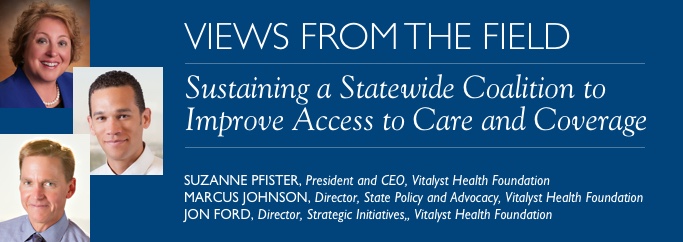
2013 was a year like no other for coverage advocates in the United States. With the Affordable Care Act’s (ACA) first year of open enrollment nearly upon us, Vitalyst Health Foundation initially convened a small group of key Arizona partners to discuss how to most effectively deal with an incredible coverage opportunity amidst an uncertain landscape. Our goal was clear: to ensure that every eligible Arizonan obtained coverage. Our path was not at all clear, because:
- federal rules were being written on the fly;
- as a federally-facilitated marketplace, we had to rely on the federal website’s performance; and
- our state government’s position on enrollment was explicitly hands-off.
Not long after the group’s initial discussions, Arizona took the extraordinary step to become one of the first Republican-controlled states to expand Medicaid eligibility. However, that expenditure of political capital only cemented the state’s reticence to provide any overt enrollment cooperation, and state funding was essentially banned by the legislature a year later. This environment gave rise to the Cover Arizona Coalition. What started as a handful of partners around one table in early 2013 is today a statewide network of over 1,000 committed partners. This is their story.
The Cover Arizona Coalition
Cover Arizona operates as the state’s primary connective tissue for health insurance outreach and enrollment. In its simplest form, it is a community of practice: a network through which professionals can share with and learn from each another. Comprised of community-based organizations, public agencies, health centers, health plans, hospitals, and trade associations, the coalition has contributed to precipitous drops in the state’s uninsured rate, from 17.1 percent in 2013 to 10 percent in 2016. It has also built muscle to inform public policy and advocacy. Vitalyst serves as the backbone and lead convener, providing dedicated staff, financial support, and in-kind support. The foundation also supports the coalition’s website and statewide online scheduling tool.
While Vitalyst has supported infrastructure, the coalition’s work has always been community-owned and coordinated by four regional leads. This structure, which we lovingly joke is held together by duct tape and baling wire, has contributed to:
- more than 600,000 Arizonans gaining health coverage through the Marketplace and Medicaid;
- state and federal advocacy efforts to protect coverage;
- new outreach and enrollment funding opportunities;
- sustained leadership, even with staff transitions; and
- trusted, long-standing partner relationships.
Outreach and Enrollment: Past, Present and Future
Navigators and assisters have been a major contributor to advancing coverage. Each year, Cover Arizona hosts a regional training series to ensure that 300+ workers are prepared for open enrollment. Even with a recent federal funding rollback, coalition partners have come together to “find a way.” Pockets of innovation to sustain the workforce are emerging through collective iteration. Hospitals and health plans, for example, are increasingly interested in hiring care coordination professionals in community-based settings. Further, some navigator and assister organizations have contracted with health systems to ensure that patients remain insured, follow provider orders, and avoid risky behavior.
Arizona’s legislature also recently approved voluntary certification for Community Health Workers (CHWs) that can open new doors to reimbursement—an effort led by a Vitalyst grantee. Many assisters in Arizona also consider themselves functional CHWs already, so continued cross-training may be one key to sustaining them going forward.
What We’ve Learned:
- Outreach and enrollment is place-based. After each Marketplace open enrollment, Cover Arizona evaluates regional data, trends, and experiences. Local insights have been critical to improvement. For example, while large enrollment events in urban areas have proven to produce low returns on investment, rural partners rely heavily on such events, where attendance flourishes due to “word-of-mouth promotion” in tightly-knit communities. Getting “on the ground” with communities provides far more insight than a spreadsheet.
- The goal is to normalize enrollment through systems change. Coalition members are well-aware of sustainability threats from diminishing enrollment resources. It is imperative that we think differently. Accordingly, Cover Arizona is exploring new strategies to integrate enrollment into long-standing systems.
- Coverage is only the beginning. Even as Arizona’s uninsured rate falls, high-deductible health plans and growing health care costs still present barriers. While coalition leadership determined that addressing costs and prices fell outside its scope, partners have begun exploring options.
- Coalitions should be an extension of a funder, not a reflection. Coalitions need to be afforded flexibility to grow an independent culture. Backbone organizations must maintain boundaries between their work and that of the coalition if that coalition is to thrive. Without clarity, lines blur, and confusion about roles, power, and authority runs rampant (particularly when members are also grantees). Vitalyst frequently tests when it is best to step up and, perhaps more importantly, step back.
- Coalitions move at the speed of trust. This is not a novel concept, but it deserves emphasis. Establishing a safe and trustworthy space for individuals to share ideas freely is the foundation from which collaborative work is built. For Vitalyst, this meant investment in staff development, setting realistic expectations about contribution versus attribution, and being willing to serve as a compassionate mediator.
- Be willing to learn and adapt. Even in a challenging political climate, the coalition continues to champion a culture of shared learning, ownership and a drive to improve coverage. Paradoxically, the uncertainty has reinvigorated coalition efforts to address issues ranging from enrollment to pricing, to the social determinants of health.
- Be the steady hand. Foundations that function as coalition backbones have the unique opportunity to both crawl in the weeds and climb atop the trees, helping to bring clarity to coalition thinking and direction. Congress’ recent ACA repeal attempts brought this lesson home, as coalition members avoided divergent crisis reactions and unified to share unbiased and focused messaging from which advocates could engage.
What began as an effort to increase health insurance coverage has grown into a sustained statewide network of professionals dedicated to advancing coverage and care more broadly. Cover Arizona is far from perfect, but its relationships and leadership have proven their efficacy, and it is primed to unearth new possibilities that will drive the coalition forward successfully and sustainably.

